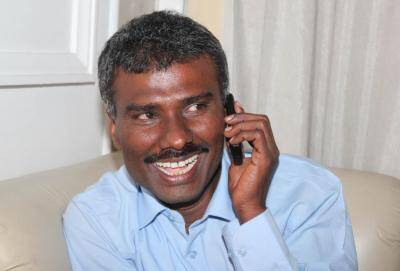The international director of the Jesuit Refugee Service, Peter Balleis, S.J., said, J.R.S. staff in Afghanistan and around the world were elated to have Alexis Prem Kumar, S.J., home in India and recuperating after almost nine months of captivity. “He’s in good spirits, physically well; [though] he lost a lot of weight.…We are happy to have him back,” Father Balleis said.
Describing Father Kumar’s ordeal, Father Balleis said the Indian Jesuit had not been mistreated by his kidnappers, presumed to be members of the Taliban, who frequently told Father Kumar they intended to release him. “He had in the morning time to pray, which was very important to him,” Father Balleis said. “Trusting that J.R.S. will look for him and will do what is necessary to get him back,” Father Balleis said, “that kept him going.”
Father Kumar was abducted from a J.R.S.-supported school in Herat Province in western Afghanistan on June 2, 2014. In India on Feb. 26, Father Kumar told reporters that he was released with a warning by his captors: “I was told that I will be shot if I choose to come back to Afghanistan.” Father Kumar said his abductors kept him in chains most of the time, and he was never left without an armed guard.
According to Father Balleis, the first eight days after his kidnapping were perhaps the hardest on Father Kumar. He was kept in handcuffs and shackles in a cave during this period.
Why Father Kumar was taken in the first place may never be clear, said Father Balleis, nor could he speculate on the terms of his release. “Normally most of the people are taken for ransom or for the exchange of political prisoners,” he said, adding, “we don’t know what the negotiations were with the Indian government.”
Father Balleis said that prior to Father Kumar’s abduction, Indian Jesuits had worked in Afghanistan for years without being targeted by Taliban or criminal gangs active in the region, and a degree of complacency may have set in regarding the inherent risks of working in such a troubled region. Ironically Father Kumar had been attempting to leave Afghanistan because of a security alert. His flight out was canceled and he had returned to the school “without people realizing it.” At that time, Father Balleis believes an “informer” at the school contacted kidnappers and alerted them to Father Kumar’s presence.
The kidnapping has not led to any diminishment to J.R.S. activities in Afghanistan or other conflict zones, like Syria and Iraq, where J.R.S. operates. Father Balleis said, however, that J.R.S. did begin a review of its security protocols. “Our security concern and preparedness has come to another level,” he said. “We are running now in all regions where it is risky security training for our teams because a few things you can avoid and save lives. They’re sometimes very simple mistakes [that can put humanitarian workers at risk] and that we can really improve.”
J.R.S. is working with a former U.N. security officer to improve its procedures. That officer told him that he had seen “too many colleagues dead because some small rules weren’t followed.”
According to Father Balleis, however, the new security measures would not mean hiring armed guards or escorts for J.R.S. programs or officers. “That’s not our way,” he said. “We are very much a grassroots organization, very much community based in general. The community is our best protection.”
Father Balleis added, “The one reality is that humanitarian work is much more at risk now than before, and church personnel, humanitarian workers, are not respected [anymore].”








